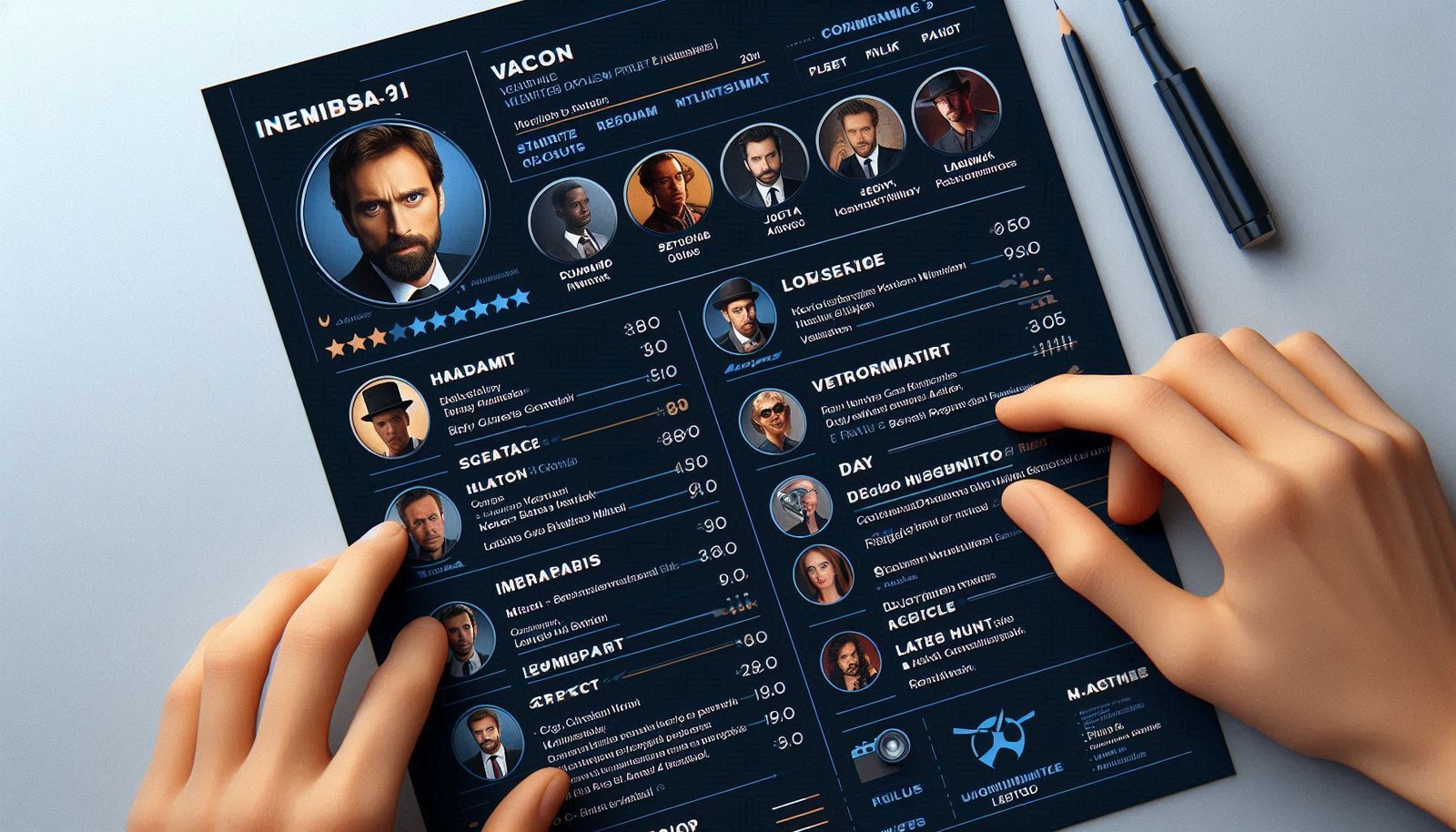Creating a résumé for the entertainment industry is a unique challenge. Whether you're pursuing a career in film, music, or theater, your résumé needs to reflect not only your skills and experience but also your creativity and passion. Entertainment roles are highly competitive, and standing out requires a document that highlights your talents in a way that resonates with hiring managers, casting directors, and industry professionals. In this article, we’ll explore the nuances of crafting résumés for the entertainment industry, focusing on tips for making your application shine in fields like film, music, and theater.
Understanding Entertainment Résumés
Unlike traditional résumés, entertainment industry résumés often emphasize creative accomplishments, collaborations, and project-based work over long-term employment. Whether you're an actor, director, musician, or behind-the-scenes technician, your résumé should highlight the projects you've worked on, the roles you’ve played, and the skills you’ve acquired along the way.
Key Elements of an Entertainment Résumé:
- Creative Achievements: List your most prominent performances, roles, or creative works.
- Relevant Skills: Highlight industry-specific skills such as editing, directing, instrument mastery, or vocal abilities.
- Collaborations: Showcase projects where you've worked with notable professionals or in high-profile settings.
- Portfolio Links: Provide links to your demo reel, portfolio, or website to give employers a sense of your style and talent.
1. Crafting a Résumé for the Film Industry
In film, whether you're aiming for a position in acting, directing, editing, or behind-the-scenes roles, your résumé should be tailored to highlight your technical skills, on-set experience, and any relevant industry connections. Film professionals often rely on credits and portfolios to assess whether you have the experience and talent required for a project.
Key Sections for a Film Résumé:
1.Filmography or Acting Credits
Your filmography (for filmmakers) or acting credits (for actors) should take center stage. This section lists the films you’ve worked on, the roles you played, and your contribution to the project. For each project, include:
- Title of the film
- Role or position (Actor, Director, Editor, etc.)
- Year of release
- Production company or director
For example:
- The Silent Echo | Lead Actor | 2022 | Dreamwave Productions | Directed by Jane Doe
- The Lost City | Director | 2020 | Visionary Films | Executive Producer: John Smith
If you're in a technical role, highlight your involvement in post-production or on-set responsibilities, like cinematography or sound design.
2 .Skills Section
Film professionals need a wide range of technical skills. Directors and editors, for example, should list expertise in software such as Adobe Premiere, Final Cut Pro, or DaVinci Resolve. Actors can emphasize dialects, stunts, or improvisation skills that make them versatile in various roles.
Example:
- Camera Operation (RED, ARRI Alexa)
- Scriptwriting and Screenplay Formatting (Final Draft)
- Video Editing (Premiere Pro, Avid)
- Stunt Coordination, Fight Choreography
3.Training and Education
Formal education in film schools or acting academies can help show you're serious about your craft. Be sure to include any relevant degrees, certifications, or workshops with industry professionals that further validate your expertise.
Best Practices:
- Focus on high-profile projects: Showcase the work you’ve done with well-known production companies or directors to boost your credibility.
- Quantify success: If a film you directed received awards or your acting role earned recognition, be sure to mention those achievements.
Writing a Résumé for the Music Industry
Résumés in the music industry vary depending on the role—whether you’re a performer, composer, sound engineer, or music producer. Your résumé should emphasize musical talent, technical abilities, and performances or productions you've been a part of.
Key Sections for a Music Résumé:
1.Performance Experience
List your performances, concerts, or recordings, focusing on key collaborations, venues, and events. Musicians and vocalists should highlight:
- Venue name or event name
- Role (Soloist, Band Member, Composer, etc.)
- Year of performance
For example:
- Carnegie Hall | Solo Pianist | 2021
- Coachella Music Festival | Bassist with "The Echoes" | 2019
- Composition: Dreamscape | Performed by Los Angeles Philharmonic | 2020
2.Technical and Instrumental Skills
Musicians should list their instrumental proficiencies, along with relevant technical abilities like mixing, sound design, or production skills. Include any studio experience, as this is often a critical component of music industry jobs.
Example:
- Instruments: Guitar (Lead, Rhythm), Piano, Violin
- Software: Pro Tools, Ableton Live, Logic Pro X
- Audio Engineering, Sound Mixing, Mastering
- Composition (Classical, Electronic, Film Scoring)
3. Education and Certifications
If you’ve studied at a conservatory or earned certifications in music theory, audio production, or sound engineering, list them prominently. Music producers and engineers can benefit from certifications in industry-standard software and hardware.
Best Practices:
- Portfolio links: Include links to your SoundCloud, YouTube, or Bandcamp profiles to give hiring managers a chance to hear your work.
- Collaborations with recognized artists: If you’ve worked with notable musicians or producers, emphasize those relationships to establish credibility.
Creating a Résumé for the Theater Industry
In the world of theater, whether you’re an actor, stage manager, or set designer, your résumé should highlight stage experience, collaborations, and skills that demonstrate your theatrical expertise.
Key Sections for a Theater Résumé:
1.Theatrical Credits
Your theatrical résumé should list stage credits, including performances, direction, set design, or other behind-the-scenes roles. For actors, this section should include:
- Play title
- Role
- Year performed
- Theater company or director
Example:
- Hamlet | Ophelia | 2023 | The Globe Theatre | Directed by Emily Green
- Les Misérables | Stage Manager | 2022 | Broadway Production
For designers or stage technicians, emphasize the scope of the project, your role, and any unique contributions you made to the production.
2.Skills Section
For actors, relevant skills may include accents, dance, singing, or improvisation. For behind-the-scenes roles, list technical expertise such as lighting design, sound design, or set construction.
Example:
- Dialects: British RP, Cockney, Southern US
- Stage Combat (Certified)
- Lighting Design (ETC, GrandMA2)
- Set Construction, Scenic Painting
3.Training and Workshops
List any specialized training in acting techniques (e.g., Meisner, Stanislavski), stage management, or technical theater. If you’ve attended workshops or classes taught by well-known theater professionals, mention those as well.
Best Practices:
- Tailor for specific productions: Adjust your résumé for each role or job by emphasizing relevant skills and experience.
- Keep it concise: Theaters typically prefer a one-page résumé for actors, with only the most relevant experience highlighted.
General Tips for Entertainment Résumés
Regardless of your specific role in the entertainment industry, there are some general tips that can help make your résumé stand out:
1. Highlight Notable Collaborations
Working with industry professionals or being part of recognized productions is a great way to enhance your résumé. List collaborations with well-known directors, producers, or venues, as this adds credibility.
2 .Keep It Simple
While creativity is essential, your résumé should still be clean and easy to read. Avoid overly decorative fonts or excessive graphics. Opt for a professional yet creative design that reflects your personal brand but remains easy to navigate.
3. Include Links to Your Work
In entertainment, showcasing your work is often more important than simply listing skills. Include links to your portfolio, demo reel, or website where potential employers can see your creative abilities in action.
4.4 Use Industry Terminology
Familiarize yourself with industry-specific jargon and use it appropriately throughout your résumé. This not only demonstrates your knowledge of the field but also shows that you're part of the industry.
Conclusion
Crafting a résumé for the entertainment industry requires a blend of creativity and professionalism. Whether you're in film, music, or theater, the key is to present your skills, experience, and accomplishments in a way that resonates with industry insiders. Tailor your résumé to each specific job or role, highlight your most notable projects, and always include links to your work to provide a tangible demonstration of your talents. With the right approach, your résumé can help you secure your next big break in the entertainment industry.
Key Takeaways:
- Tailor your résumé to your specific role within the entertainment industry.
- Focus on key achievements, collaborations, and technical skills.
- Include links to your portfolio or demo reel to showcase your work.
- Keep your résumé clear, concise, and professional while reflecting your creative talent.






